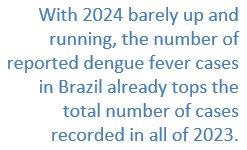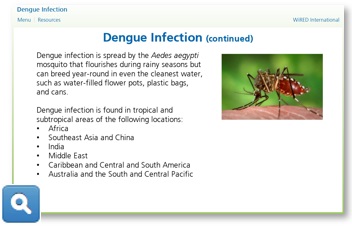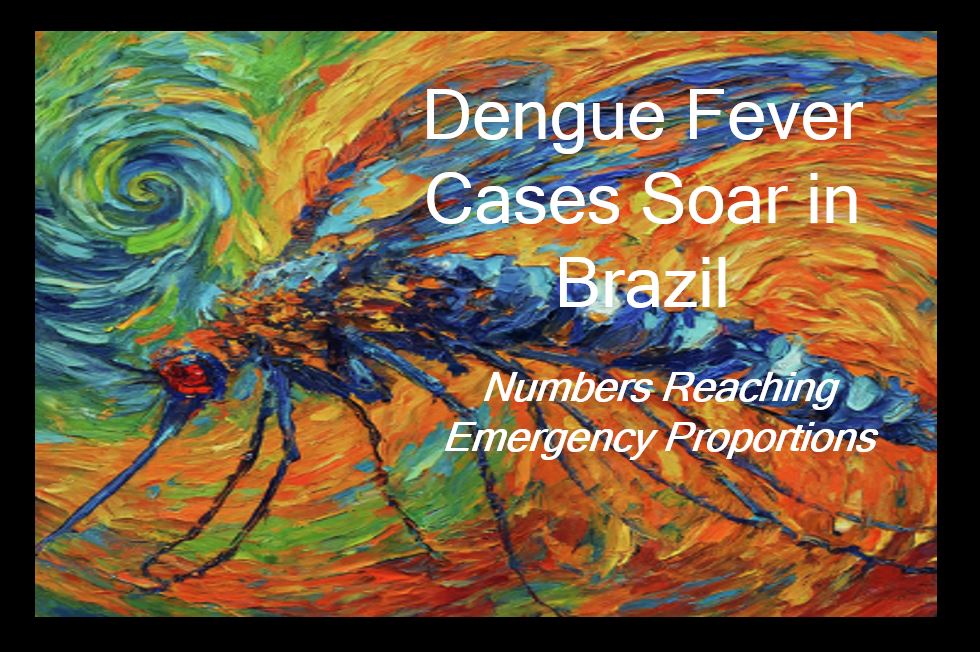By Allison Kozicharow; Edited by Elizabeth Fine
Dengue fever is sweeping through Brazil’s population causing states of emergency and prompting mass vaccinations.
 The sometime fatal illness (see sidebar) occurs thanks to the bite of the Aedes aegypti mosquito, whose migration is ever expanding due mainly to climate change and exacerbated by El Niño effects of warmer temperatures and extra rainfall. This mosquito advance is inching up into areas where dengue has never been seen before, including in the United States.
The sometime fatal illness (see sidebar) occurs thanks to the bite of the Aedes aegypti mosquito, whose migration is ever expanding due mainly to climate change and exacerbated by El Niño effects of warmer temperatures and extra rainfall. This mosquito advance is inching up into areas where dengue has never been seen before, including in the United States.
 With 2024 barely up and running, the number of reported dengue fever cases in Brazil already tops the total number of cases recorded in all of 2023. The crisis is so dire that Brazil’s Health Ministry predicts more than 4.2 million cases by this year’s end, more than the total number of cases recorded in all the Americas last year. In a disturbing echo of the COVID-19 pandemic, the capital city of Brasília has set up a field hospital to cope with administering to the many sick.
With 2024 barely up and running, the number of reported dengue fever cases in Brazil already tops the total number of cases recorded in all of 2023. The crisis is so dire that Brazil’s Health Ministry predicts more than 4.2 million cases by this year’s end, more than the total number of cases recorded in all the Americas last year. In a disturbing echo of the COVID-19 pandemic, the capital city of Brasília has set up a field hospital to cope with administering to the many sick.
WiRED International offers a Dengue Infection module for general audiences (also offered in Spanish), which provides an overview of the condition, how it spreads, its diagnoses, treatments and prevention measures.
WiRED will continue to monitor and report on the dengue emergency in Brazil and elsewhere.
What Is Dengue?
Dengue fever is an infection caused by four related viruses that are spread by female mosquitoes of the Aedes aegypti species. These mosquitoes thrive in and near human habitations, where they breed in even the cleanest water. The disease is widespread in the tropics.
Dengue — known to health experts for more than 200 years — used to be called “break-bone fever” because it sometimes causes severe joint and muscle pain that feels as if bones are breaking. For people who get sick with dengue, symptoms can be mild or severe. Although most patients recover after about a week, more serious forms of the disease include dengue hemorrhagic fever and dengue shock syndrome, which can result in shock, internal bleeding and even death.
How to Avoid Dengue
The best measures to prevent and control dengue and other mosquito-borne viruses on an individual and global level include the following:
- Keep away from areas where mosquitoes are prevalent.
- Wear clothing that covers the entire body.
- Use nets, window screens, fans or air conditioning if available.
- Get educated about insect repellents.
- Use only repellents approved by the U.S. Environmental Protection Agency.
- Don’t blend repellents and sunscreen.
- Travel safely and wisely and bring a travel health kit.
- Improve sanitation in areas of standing water.
- Decrease carbon emissions worldwide.
- Continue to improve the current ineffective vaccine.


